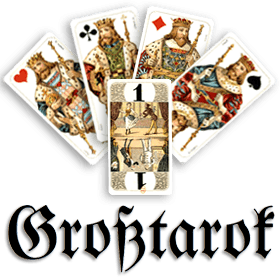Grosstarock
 Grosstarock adalah permainan kad tiga tangan lama keluarga Tarock yang dimainkan dengan pek Tarot 78 kad penuh. Ia mungkin diperkenalkan ke negara-negara Jerman selatan sekitar tahun 1720, tetapi menyebar dengan cepat ke Austria dan utara sejauh Belanda dan Skandinavia. Ia hanya bertahan hari ini di Denmark di mana ia disebut Tarok, tetapi juga disebut dalam bahasa Inggeris sebagai Tarok Denmark. - Wikipedia
Grosstarock adalah permainan kad tiga tangan lama keluarga Tarock yang dimainkan dengan pek Tarot 78 kad penuh. Ia mungkin diperkenalkan ke negara-negara Jerman selatan sekitar tahun 1720, tetapi menyebar dengan cepat ke Austria dan utara sejauh Belanda dan Skandinavia. Ia hanya bertahan hari ini di Denmark di mana ia disebut Tarok, tetapi juga disebut dalam bahasa Inggeris sebagai Tarok Denmark. - Wikipedia
Bilangan pemain: 2 - 4
masa permainan: 56 mn
Kerumitan: 3 / 5
Main Grosstarock dan 1229 permainan lain atas talian.
Tidak perlu dimuat turun - main terus dari laman web anda.
Dengan rakan-rakan dan beribu-ribu pemain dari seluruh dunia.
Percuma.

Main Grosstarock dan 1229 permainan lain atas talian.
Tidak perlu dimuat turun - main terus dari laman web anda.
Dengan rakan-rakan dan beribu-ribu pemain dari seluruh dunia.
Percuma.

Ringakasan peraturan
Grosstarock is a point-trick game for 3 players played with a 78 card tarot deck with a particular emphasis on the last trick. (It can also be played as a 2-player adaption, which uses a little less skill and more luck.)
Deal
The Deal and play are counter-clockwise. The Dealer takes an extra three cards (the Talon) into their hand, and discards an equal number face down, which will count for their at the end. They may never discard an Honour (a King, the I or XXI of Trumps, or the ’Scuse/Fool), nor a card that forms part of a declaration (unless necessary). They may only discard trumps if they thereby becomes void in them.
Declarations
Beginning with the dealer, each player must make any of the following declarations, and be payed for them immediately by the other players.
- Trumps
- ‘Ten Trumps’ is worth 10 points; more may be declared for 5 more each. (E.g., ‘Eleven Trumps’ is 15, ‘Twelve Trumps’ is 20, &c.) It must be stated whether ‘with’ (avec) or ‘without’ (sans) the Pagat (the I of Trumps).
- Matadors
- ‘Three Matadors’ consists of the three cards of the Trull (the 'Scuse, the I of Trumps, and the XXI of Trumps), for 10 points. ‘Four Matadors’ adds the XX of Trumps for 15, ‘Five Matadors’ the XX and XIX for 20 , &c.
- Cavalry
- A ‘Cavalry’ is a set of all four Court Cards in one suit for 10; a ‘Half Cavalry’ is any three Court Cards in one suit plus the ’Scuse for 5, and an ‘Abundant Cavalry’ is all four Courts plus the ’Scuse for 15. The suit (and missing card) must be named.
- Kings
- ‘Kings’ is all four Kings for 10; ‘Half Kings’ is any three plus the ’Scuse for 5, and ‘Abundant Kings’ is all four Kings plus the ’Scuse. for 15. The missing suit (for Half) must be named.
Play
Eldest leads to the first trick. All must follow in turn with a card of the suit led, if possible; otherwise they must play a Trump; otherwise they may play any card. The player of the highest Trump (if any), or otherwise the highest card of the suit led, wins the trick and places the cards face down in front them. They then leads to the next trick.
The cards rank in the traditional order: In black or ‘straight’ suits, the numerals follow the Courts in descending order; in red or ‘round’ suits, the numerals follow the Courts in ascending order:
♠♣︎ K Q C J 10 9 8 7 6 5 4 3 2 1
♥♦ K Q C J 1 2 3 4 5 6 7 8 9 10
XXI, XX, XIX, ... IV, III, II, I
The ’Scuse is the exception to the obligation to follow suit or trump. It may be played at any time and excuses the player. Instead of being collected with the trick, however, it is taken into the player’s own trick pile and another card from the player’s trick pile is given to the winner of the trick instead. Note that if the player of the ’Scuse takes no tricks, they must surrender it to the winner of that trick. If played to the last trick, the ’Scuse is lost the winner of the trick. The ’Scuse may never be played to the next-to-last trick. On the third-to-last trick, a player who does not have it may demand that it be played. If led to a trick, the player of the ’Scuse names the ‘led suit.’
Any player who loses a King or the Pagat before the last trick pays 5 to each other player; if a player wins a trick with the Pagat (but not a King) before the last trick, both other players pay then 5.
Score
The following feats are then scored for: (N.B. The lower values in parentheses are for when the game is played without Pots.)
- Tout
- If a player takes all 25 tricks, both others pay them 85 (25), as well as the card points.
- Misère
- If just one player takes no tricks, each pay them 25. Ultimos and cards are not scored; failed ultimos are.
- Ultimo
- If a player takes the last trick with the Pagat or King, they receive 45 (15) from each for a Pagat Ultimo, or 40 (10) for a King.
- Failed Ultimo
- A player who plays a King or Pagat to the last trick but does not win the trick pays the ultimo value to each other player.
- Last Trick
- If none of the above has occurred, the player of the last trick receives 20 (5) from each.
Pots
The game is usually played with two pots, a King Pot and a Pagat Pot, which increase the bonuses and penalties associated with the relevant Ultimo cards.
At the start of the game and whenever a pot is empty, each player contributes 20 points to any empty pot.
Before dealing, the Dealer pays 5 to each pot, and moves them to their right.
A player who loses a King or the Pagat also pays 5 to the appropriate pot.
A player who wins or loses a King or Pagat Ultimo receives the contents of the appropriate pot, or doubles it, respectively.
A player who wins a Tout wins the contents of both pots.
At the end of the game, the pots are divided evenly.
Two Player Version
All is as above, except the following.
- One hand is simply left undealt and out of play. The dealer receives 28 cards; the opponent 25.
- There are no pots, and the lower ultimo values are used.
- Misère is not possible, since it would be the same as the other player achieving Tout.
- Rather than being scored with payments throughout, at the end of each hand each player’s score is totaled, and the difference between them is recorded for the player that has the higher total.

